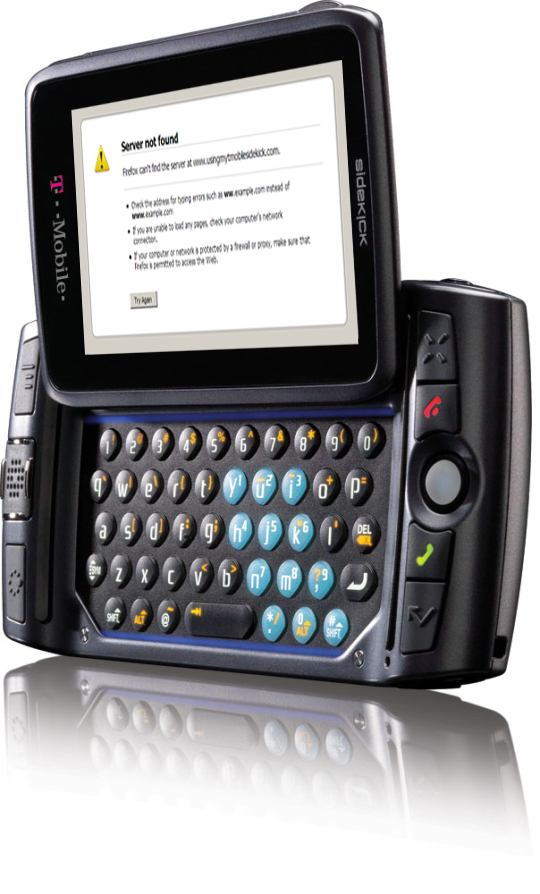T-Mobile Sidekick data outage tests mettle of 800,000 customers, carrier

Users of T-Mobile Sidekick phones have been without data service for as much as two weeks and counting.
The phone, popular among message-happy teenagers but also owned by a fair share of adults, relies on data connectivity for nearly every major function of the phone, including contacts.
A week ago, T-Mobile issued this statement:
T-Mobile and Danger/Microsoft are urgently working to restore impacted services to Sidekick, and deliver them to you as quickly as possible. Following is a status update for our valued customers:
* We expect data services to begin gradually returning in the next couple of hours (Saturday evening)
* Web browsing capabilities should be first accessible first; additional functions such as IM, social networking applications and email will then follow.
While we anticipate a significant portion of data services to be restored by Monday, some richer data services may lag. We sincerely apologize for the inconvenience, and appreciate your patience as we work hard with Danger/Microsoft to resolve this issue. We will continue to keep you updated as we have news to share. Thank you."
Since then, the situation only escalated, angering customers who understandably care about using the phones and service plans they paid for, and not about the details in how the phones operate.
On Oct. 10, T-Mobile posted the following update, titled "Sidekick customers, during this service disruption, please DO NOT remove your battery, reset your Sidekick, or allow it to lose power":
Regrettably, based on Microsoft/Danger's latest recovery assessment of their systems, we must now inform you that personal information stored on your device - such as contacts, calendar entries, to-do lists or photos - that is no longer on your Sidekick almost certainly has been lost as a result of a server failure at Microsoft/Danger. That said, our teams continue to work around-the-clock in hopes of discovering some way to recover this information. However, the likelihood of a successful outcome is extremely low.
A scary missive to users, particularly since T-Mobile, Microsoft and Danger are essentially soliciting user help for a problem that began with them.
Adding insult to injury, T-Mobile promised affected customers a free month of data service -- despite the fact that the service had not yet been reinstated.
Today, T-Mobile's trying again to placate its angry Sidekick customers -- whose service has still, as of this writing, not been reinstated -- by offering the option of a $20 discount for a T-Mobile G1 smartphone or a contract release.
Needless to say, the 800,000 or so Sidekick customers aren't thrilled.
In a final move, T-Mobile has halted all sales of the Sidekick on its site and at retail stores, listing all models as "temporarily out of stock."
This data outage -- caused by catastrophic server failure at Danger/Microsoft -- underlines the complexities of the mobile industry. In this case, the problem isn't really T-Mobile's at all, but this B2B problem is entirely the carrier's to manage, since it's been let down by a partner and simultaneously become the face of the problem.
After all, customers pay T-Mobile. In their eyes, it's T-Mobile's fault if service doesn't deliver.
Worsening the situation is the fact that T-Mobile is in the midst of ramping up its 3G data network across the U.S. The last of the Big Four carriers to do so, the company can't afford to take a black eye for its data services -- regardless of whether, in the case of the Sidekick, those services don't actually originate with T-Mobile -- much less for a phone whose expensive latest model wasn't received very well in April and, in the past, has been known as the "most stolen phone in America."
The fallout potential for T-Mobile is huge. It's only now agreeing to release customers from contract, but it can't really afford to lose any 3G customers in the first place.
To boot, the company is only just getting off the ground in the smartphone space, and though T-Mobile G1 and myTouch 3G users weren't affected, it's a public black eye for its next-generation mobile offerings.
